Prince Caspian makes his way through the woods. He hears Trufflehunter and Nikabrik sneaking behind him. “I just think we should wait for the kings and queens,” Trufflehunter says. When Caspian doesn’t pay attention to this, he sarcastically calls after him to “see if the others will be as understanding.” This prospect inspires Nikabrik to say maybe he’ll go along with Caspian. “I want to see you explain things to minotaurs.” Caspian stops walking and looks behind him, not so much scared as intrigued.
Caspian: Minotaurs? They’re real?
Trufflehunter: And very bad tempered.
Nikabrik: Not to mention big.
Trufflehunter: Huge.
Caspian: What about centaurs? Do they still exist?
Trufflehunter: Well, the centaurs will probably fight on your side but there’s no telling what the others will do.
Caspian hesitates before asking another question, this one as if he’s scared of the answer. “What about Aslan?” Now while he’s never the protagonist and usually doesn’t show up until two thirds of the story are over, Aslan is the only character to appear in all seven Narnia books and is probably the most important one. A common fan criticism of these movie adaptations is that he doesn’t feel as important as he does in the books. I feel like Prince Caspian is the Narnia movie in which that is a problem the least, in part because of things like that pregnant pause before asking about Aslan.
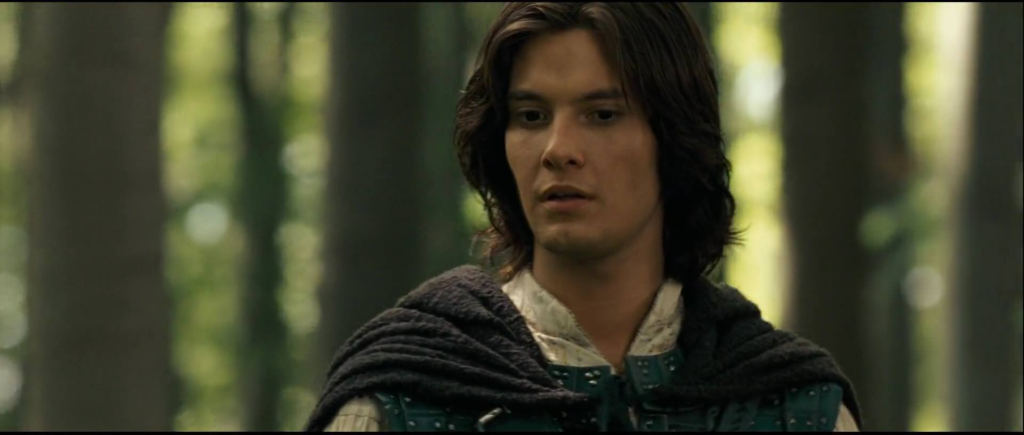
Anyway, by this time, Trufflehunter and Nikabrik have overtaken Caspian. Now it’s their turn to stop walking and turn around, intrigued. “How do you know so much about us?” asks Nikabrik suspiciously. “Stories,” replies Caspian. “Your father told you stories about Narnia?” asks Trufflehunter. I’m really not sure why he would assume it was Caspian’s father who would tell him those Narnia. I guess the screenwriters just wanted to establish that his deceased paternal parent is a sore point for the character. Sure enough, he clams up. “No, my professor,” he says[1]As I wrote in my last post, in the book, it was also his nurse., “Listen, I am sorry. These are not the kind of questions you should be asking.” Just then Trufflehunter smells something dangerous. It’s a group of Telmarine soldiers with their bows pointed at the group who promptly run for it.[2]I was going to argue that it doesn’t make sense for Caspian to run here since he was heading back to the Telmarines anyway and, at this point, Miraz is pretending that the Narnians were the … Continue reading
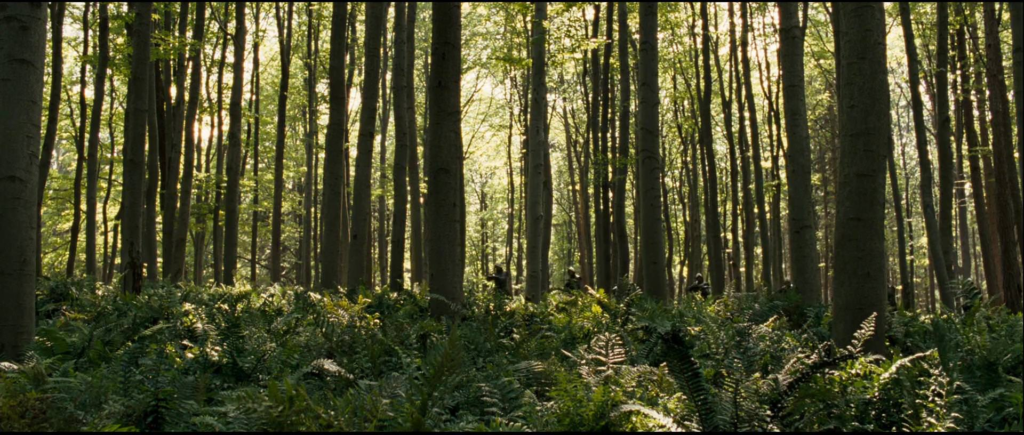
This chase scene isn’t from the book, and I know some book fans would criticize Hollywood for adding action scenes for the sake of more action. I was able to do that, to an extent, with the added action scenes in The Lion, the Witch and the Wardrobe. But with this scene in this movie, honestly, I really enjoy that. There’s one cheesy shot that tracks an arrow but other than that, I really enjoy the chase for its own sake and feel no desire to make the movie closer to the book by removing it. Sue me.
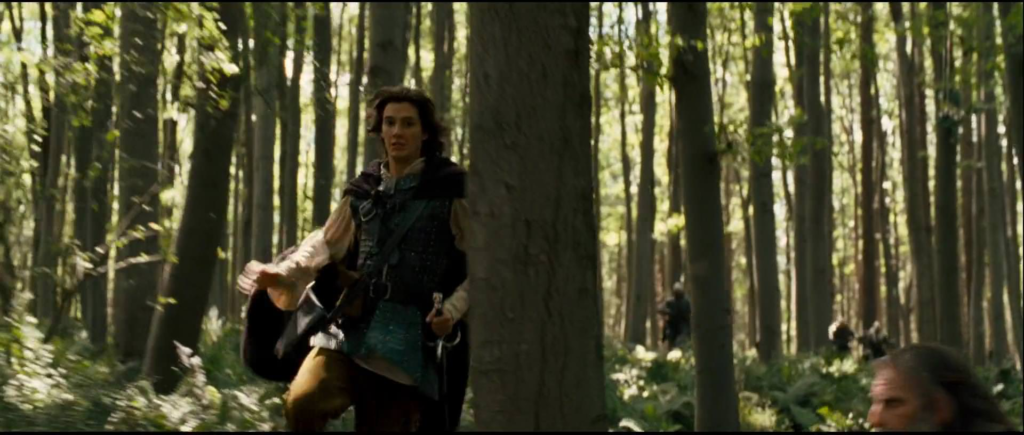
At one point, an arrow pierces Trufflehunter and he falls to the ground. Both Nikabrik and Caspian turn to go back for him, and the latter tells the former not to bother. Even though he doesn’t trust Caspian, Nikabrik obeys. (I guess he just realizes that Caspian’s legs are longer?) Trufflehunter hands Caspian the horn. “Take it! Go! It’s more important than I am,” he says. As Caspian hastily bundles up the horn, he sees something strange. Something is sneaking under the forest undergrowth and apparently cutting off the feet of the Telmarine bowmen.[3]We don’t see any feet being cut off, of course. In fact, if you pause the movie, you can see them intact as some Telmarine fall on their backs. But that seems to be the implication. This scene … Continue reading Caspian manages to hoist Trufflehunter onto his shoulder and run away. Soldiers pursue him but more and more of them fall. It starts to feel less like they’re running after the prince and the badger and more like they’re running away from whatever is attacking them.
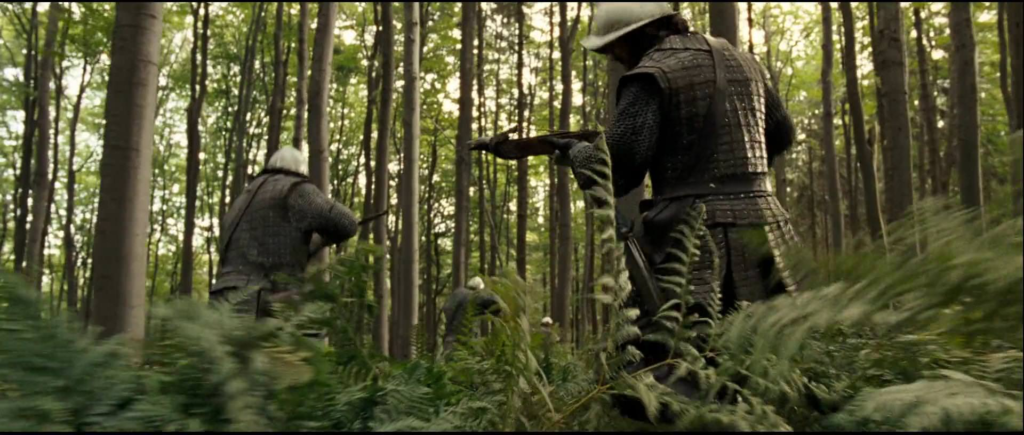
By the time, Caspian gets Trufflehunter to Nikabrik and tells him to get him out of there, there are only two soldiers left.
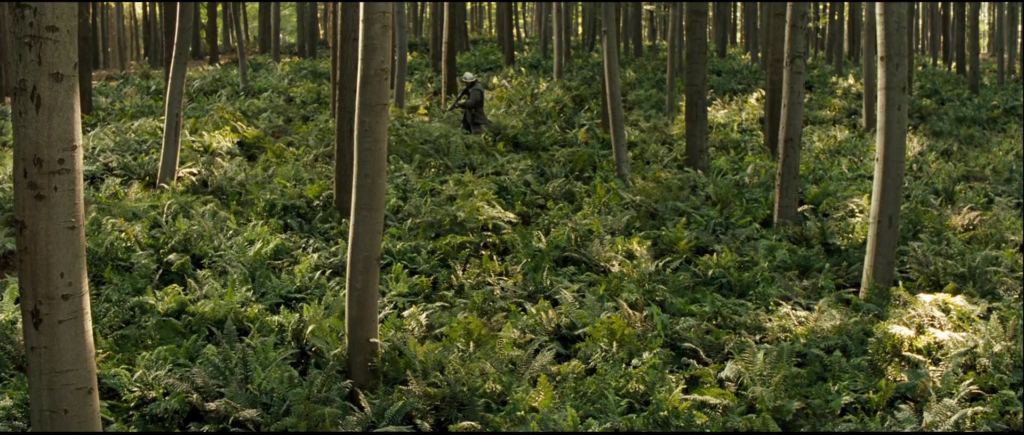
Make that one.
Caspian really should take this moment to run himself but as the remaining soldier hacks desperately at the underbrush with his sword, searching for his invisible opponent, he just stands there and stares, apparently overcome by curiosity. Fans of the book will have already guessed what’s happening here and I don’t mean that as a criticism. In fact, as a fan myself, I enjoyed the realization of what was coming-or rather who was coming. The Telmarine falls and its killer heads straight for Caspian, coming closer and closer until, rather than stabbing him in the foot, it (fortunately) leaps onto his chest knocking him backward. It turns out to be a foot-high mouse wearing a swordbelt and, around its head, a little gold circlet with a dashing red feather. It draws its sword and points it at Caspian’s throat, saying (in Eddie Izzard’s voice), “Choose your last words carefully, Telmarine.”
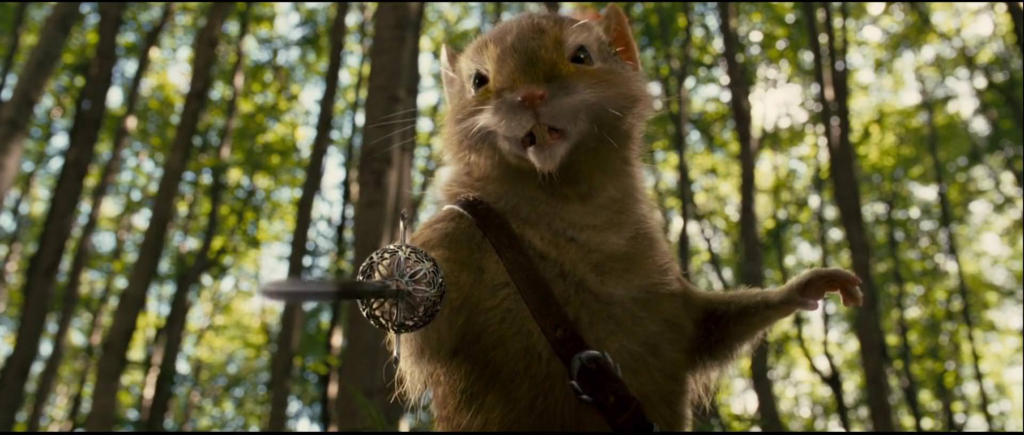
Caspian just stares at it in bewilderment. “You are a mouse,” he says. The mouse sighs. “I was hoping for something a little more original,” he says. This is Reepicheep, one of the most iconic and quotable characters in the Narnia books. He’s also surprisingly complex[4]Albeit not so much in Prince Caspian as in the next story, The Voyage of the Dawn Treader. and I’m not sure any adaptation has gotten him entirely right. That doesn’t mean every adaptation has gotten him terribly wrong though! There’s a lot to appreciate about this version. Reepicheep’s personality here is almost exactly like it is in the book except for one nagging little detail. He’s too quippy and sarcastic. While C. S. Lewis’s Reepicheep was definitely intended to be funny, he was funny in spite of himself. All of his dialogue was elegant, courtly and fiercely dignified. I can definitely see the character being annoyed by his victims being surprised that a mouse was killing them but not him saying, “I was hoping for something a little more original.” If I were to rewrite the scene, I would have him give Caspian a death glare as he started to say “mouse” and have Caspian amend it to “mighty warrior.” That would still be funny while also being truer the book’s character. I’d also have Reepicheep be voiced by a “serious” actor rather than a comedian to send the message that he wasn’t trying to be funny.[5]Honestly, even granting that the cinematic Reepicheep is more sarcastic than his literary counterpart, the role still doesn’t play that much to Izzard’s strengths as a performer anyway.
Having said that, Reepicheep is easily the best comedic relief supporting character in any of the Narnia movies.[6]The only one funnier is Eustace Scrubb in the next movie and he’s more of a protagonist than a supporting character. Actually, Reepicheep himself becomes something of a protagonist in that … Continue reading He’s far funnier than the beavers were in The Lion, the Witch and the Wardrobe. And to be fair, when the movie gives Reepicheep a serious line-which it does at least as often as it does a humorous one-Izzard delivers it well.
Reepicheep: Pick up your sword.
Caspian: Uh, no thanks.
Reepicheep: Pick it up! I will not fight an unarmed man.
Caspian: Which is why I might live longer if I choose not to cross blades with you, noble mouse.
Reepicheep: I said I would not fight you. I didn’t say I’d let you live!
Fortunately, Trufflehunter, propped up by Nikabrik, intervenes. (Apparently, his wound just winded him; it wasn’t that serious.) “I trust you have a very good reason for this untimely interruption,” says Reepicheep. “He doesn’t. Go ahead,” says Nikabrik. Ha ha! It’s not just Reepicheep actually. This Narnia movie in general makes me laugh louder and more consistently than the previous one did. I criticized The Lion, the Witch and the Wardrobe‘s screenplay for being written like a generic quippy action movie. That’s as true or truer of Prince Caspian but I find myself enjoying the generically Hollywood-esque banter in it a lot more. It may not be what I’d prefer for a Narnia adaptation but if they had to write it this way, at least they’re doing it well and much the same could be said for the action scenes. Trufflehunter tells Reepicheep that Caspian is the one that blew the horn and Reepicheep looks at him with more respect. “Then let him come forward,” says a voice. It belongs to Glenstorm (Cornell S. John), a centaur who is accompanied by three others, his sons (Ephraim Goldin, Yemi A. D. and Carlos DaSilva.) “This is the reason we have gathered.” C. S. Lewis depicted centaurs in the Narnia books as intimidatingly wise and solemn beings. (“No one ever laughed at a centaur,” says one character in the book Prince Caspian.) John projects that kind of presence perfectly, even with just his voice. He’s much more memorable than Patrick Kake’s centaur in The Lion, the Witch and the Wardrobe.[7]C. S. Lewis almost certainly didn’t intend the centaurs to be dark skinned but, while 2008 was a politically contentious year for my country (America), people were less sensitive about color … Continue reading
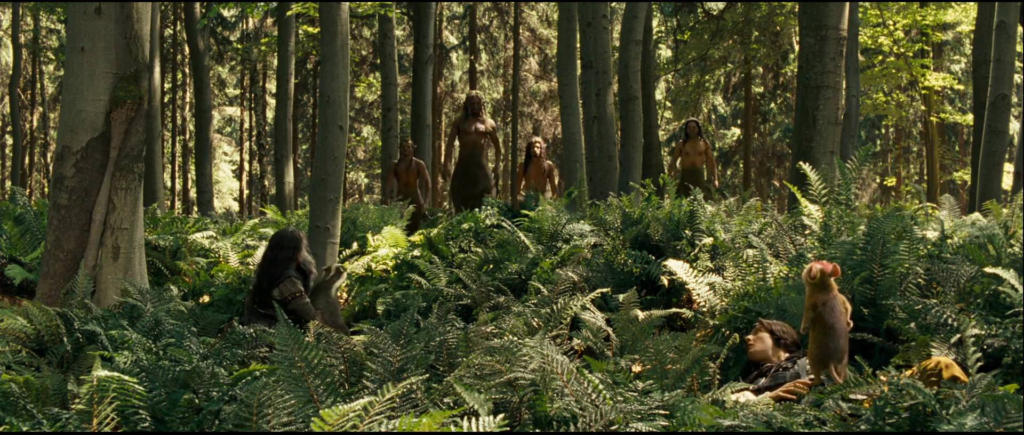
It is weird to me that the Narnians assume Caspian must be good because he blew the horn. Very shortly in the movie, Nikabrik will say this just proves the Telmarines have stolen something else from them and… yeah, that attitude makes more sense. But I’ll get into that in the next scene with Caspian.
Elsewhere, Peter, Susan, Edmund, Lucy and Trumpkin are threading their way through trees and rocks. Susan isn’t sure they’re going the right direction. “That’s the problem with girls,” says Peter, “Can’t carry a map in your heads.” To which Lucy replies, “That’s because our heads have something in them.” That exchange was from the book though there it was between Edmund and Lucy. As I wrote in my last post, I feel like this Narnia movies includes more dialogue from its source material than the last one. Props to them for that, particularly in this case because it’s hilarious. Susan whispers to Lucy that she wishes Peter would listen to “the D. L. F.” “The D. L. F.?” asks Edmund. “Dear Little Friend,” explains Lucy. “Oh, that’s not at all patronizing, is it?” Trumpkin snarks. That nickname was also from the book. There it was actually bestowed on Trumpkin by Edmund as payback for him calling the Pevensies his “dear little friends”[8]“Little from you is really a bit too much!” Edmund says in the book. I’m surprised that line wasn’t in the movie. before observing their royal skills and pledging his fealty to them. The nickname would have made more sense in the film if that had been included but, as things are, it’s still very funny.
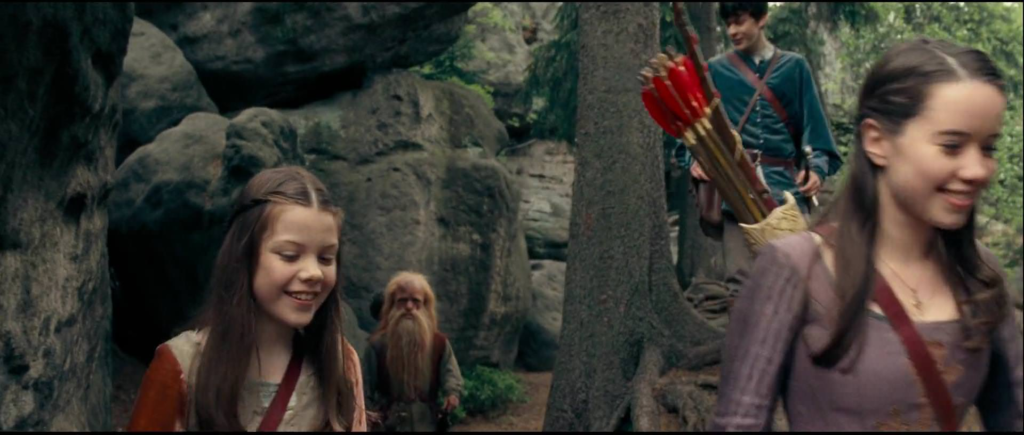
Peter stops and looks around him in confusion. “I’m not lost,” he insists, mainly to himself, it seems. “No, you’re just going the wrong way,” says Trumpkin. OK, I know I just wrote that I was enjoying the movie’s banter on its own terms even if it’s not what I’d prefer for a Narnia movie, but sometimes, even on those terms, it can be a little tiresome. Characters don’t need to respond to everything with a quip; it can get kind of annoying. To be fair though, the book does portray the characters as being wearied of wandering in the woods with minimal food and generally uncomfortable conditions and as being a bit short tempered as a result.[9]I actually imagine the exchange about maps and brains in the book as being snippier than it is in the film. I don’t think the movie is actually a huge stretch.
Peter: You last saw Caspian at the Shuddering Woods and the quickest way there is to cross at the river Rush.
Trumpkin: But unless I’m mistaken, there’s no crossing in these parts.
Peter: That explains it then. You’re mistaken.
I feel like the movie’s problem of Peter being unpleasant would be halved if William Moseley just delivered that last line as a cocky joke instead of an angry one. I mean, Peter would be an arrogant jerk either way, which he really isn’t in the book, but at least he could be a fun jerk and our satisfaction in seeing his comeuppance would be less grim. Then again, I kind of admire how seriously the movie takes the character’s flaw of arrogance. It’s pretty typical for Hollywood action heroes to be full of themselves. (Think Robin Hood or Han Solo.) I feel like treating the hero’s pride as a serious vice the way this movie does is somewhat unusual.[10]Though maybe I’m not giving Star Wars or The Adventures of Robin Hood enough credit.
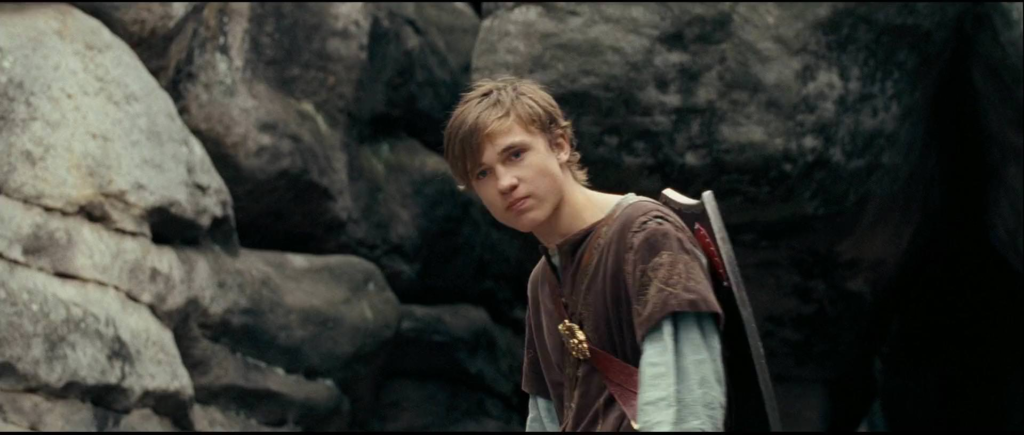
Peter leads his followers to the Rush, but it doesn’t make him look very good since the river is now at the bottom of a deep gorge.
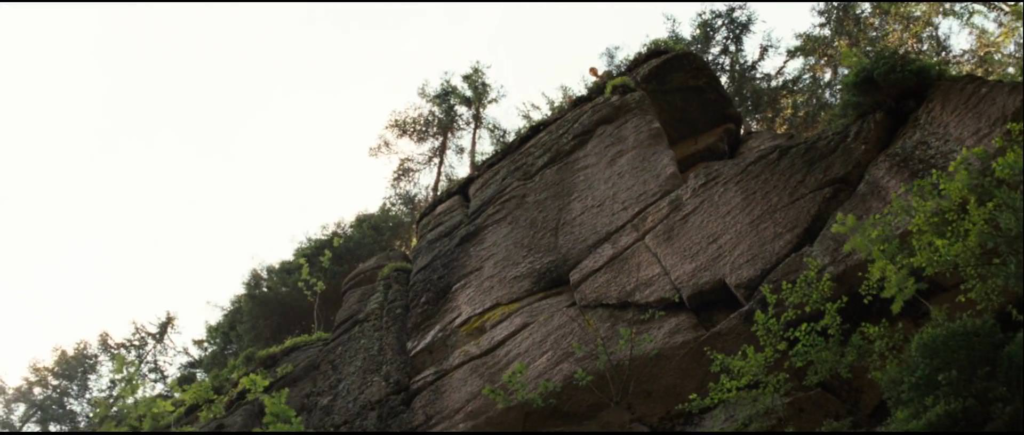
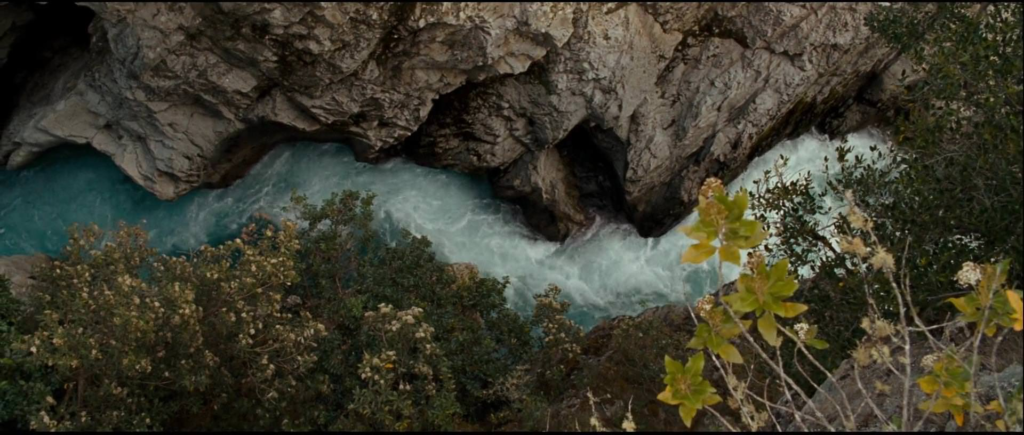
Susan: See, over time water erodes the earth’s soil, carving deeper-
Peter: Oh, shut up.
Did I mention this movie was really funny?
Edmund asks if there’s a way down. “Yeah, falling,” says Trumpkin. Peter still pathetically insists that he wasn’t lost even if he led everyone in a useless direction. In the book at this point, the characters were trying to find the Rush so they could follow it, not cross it and Trumpkin actually cheers a despondent Peter up by saying that even if the river is now at the bottom of a gorge, they can still follow it.[11]To be fair to the movie, Caspian hasn’t yet reached the location he’s at when the Pevensies and Trumpkin are searching for him in the book. Here he tells the Pevensies that their best bet is to head for the ford near Beruna. He starts to lead them away when Lucy, still looking across the river, says, “Aslan? It’s Aslan! It’s Aslan over there! Don’t you see? He’s right…” But as everyone turns to follow her pointing finger, Lucy’s face, which has lit up, falls. No Aslan can be seen across the gorge.
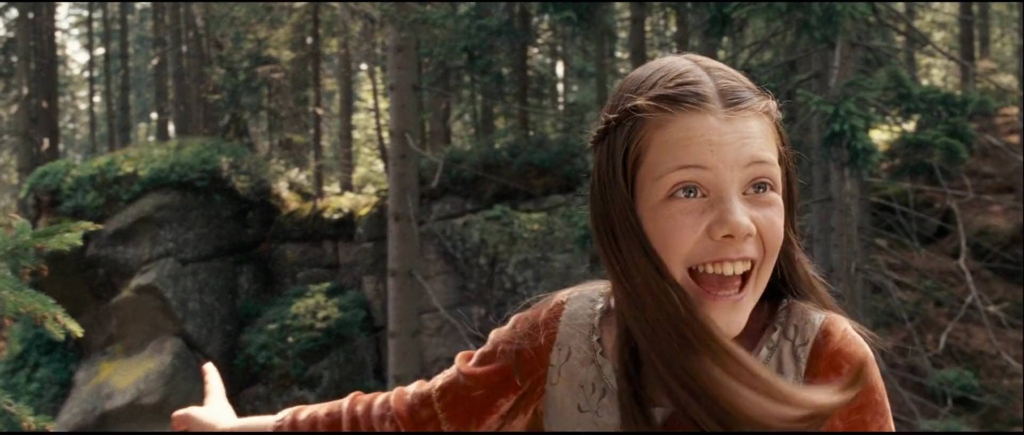

“Do you see him now?” Trumpkin asks, sounding a bit worried. “I’m not crazy,” insists Lucy. “He was there. He wanted us to follow him.” The others exchange unsure glances. There’s something subtle I love about this scene in the book. Lewis doesn’t write, “Suddenly, Lucy saw Aslan” or anything like that. Instead, he has her interrupt a conversation between the others with the news. The movie happily captures that by not showing us Aslan from her point of view. This puts us in the same position as her companions. I’d say it works even better dramatically in the book where Trumpkin has made a good argument for following the river and Aslan leading the characters a different direction is something of an inconvenience. Here, Trumpkin has made looking for Beruna seem like a necessary evil (“How do you feel about swimming?”), altering the dynamics of the scene. But it still works.
Peter: I’m sure there are any number of lions in this wood. Just like that bear.
Lucy: I think I know Aslan when I see him!
Trumpkin: Look, I’m not about to jump off a cliff after someone who doesn’t exist.
Edmund: The last time I didn’t believe Lucy, I ended up looking pretty stupid.
Props to the movie for keeping the book’s detail of Edmund being the only one to really advocate for trusting Lucy! That was definitely a memorable character moment. Peter pauses as if considering his brother’s point but isn’t quite convinced. “Why wouldn’t I have seen him?” he asks Lucy. Since I criticized Moseley’s performance earlier, I should say that I like the way he infuses that question with wistfulness, implying that Peter is wishing for comfort from Aslan and really wishes he had seen him. “Maybe you weren’t looking,” Lucy replies. That line could have been written for another book C. S. Lewis wrote, Till We Have Faces. Reminding me of Till We Have Faces is almost always a great thing. “I’m sorry, Lu,” says Peter and he leads Susan and Trumpkin away. Lucy stares sadly at the place she saw Aslan. Edmund gives her a sympathetic look, then they both follow the others. This is far from the flashiest scene in either the book or the movie, but it is a highly pivotal one and they do a great non-flashy job with it.
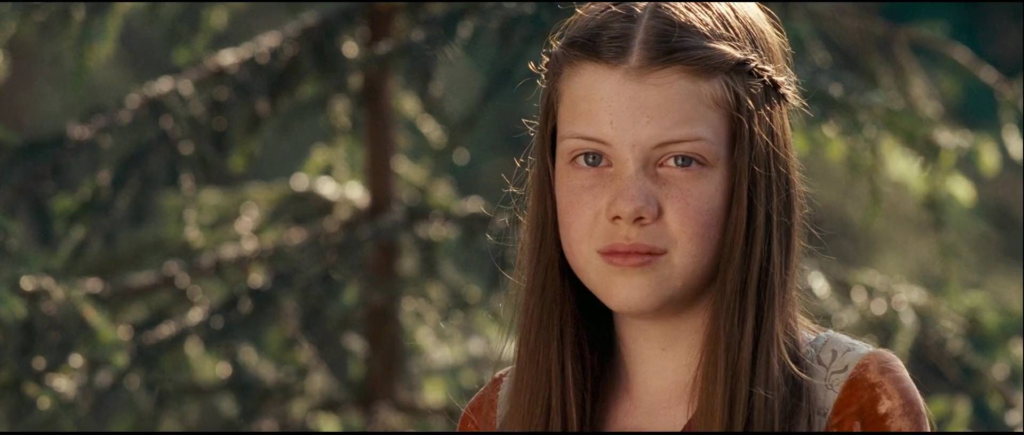
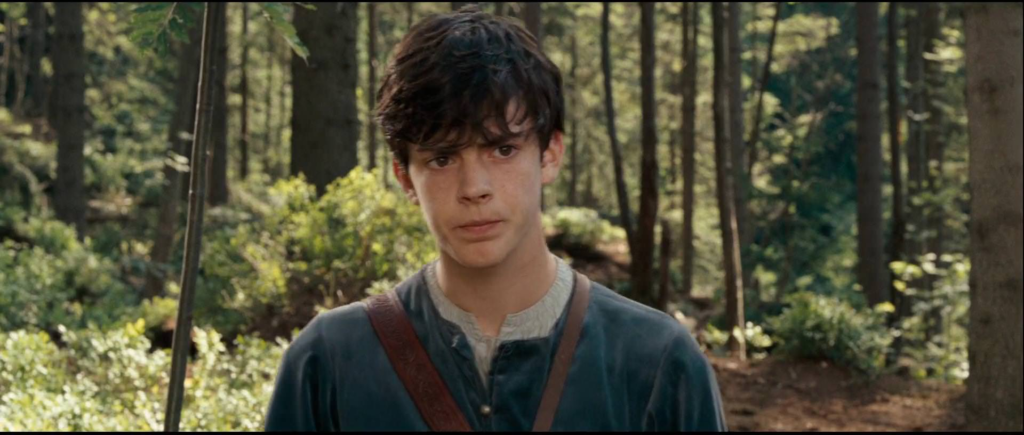
We cut to what I assume is Dancing Lawn at night. I assume that because it’s where this scene’s equivalent in the book takes place though no dancing takes place there in the movie. The Narnians or what the book calls “the people that lived in hiding” have gathered and are debating whether they should follow Caspian as their king or not. It’s not really clear why the question is on the table in the first place. A couple of marketing tie-in books give Trufflehunter a line about it being said that whoever sounded Queen Susan’s horn would bring back the Ancient Kings and Queens and lead the Narnians to freedom. No such prophecy was in the book but if that line of dialogue was originally in the screenplay, it really should have been kept because the way the Narnians talk about Caspian is confusing without it.[12]If the line wasn’t in the screenplay originally, I have to credit the people who wrote the marketing tie-in books with being better at exposition than the screenwriters!
Nikabrik: All this horn proves is that they’ve stolen yet another thing from us!
Caspian: I didn’t steal anything.
A Minotaur (voiced by Josh Campbell with Shane Rangi in the suit)[13]Aren’t the minotaurs supposed to be bad guys? We’ll get to that later.: Didn’t steal anything?! Shall we list the things the Telmarines have taken?
Glenstorm’s Wife (Lejla Abbasova): Our home!
A Faun (Curtis Matthew): Our freedom!
Someone I Can’t Identify in the Crowd: Our lives!
Caspian: You Would hold me accountable for all the crimes of my people.
Nikabrik: Accountable and punishable.
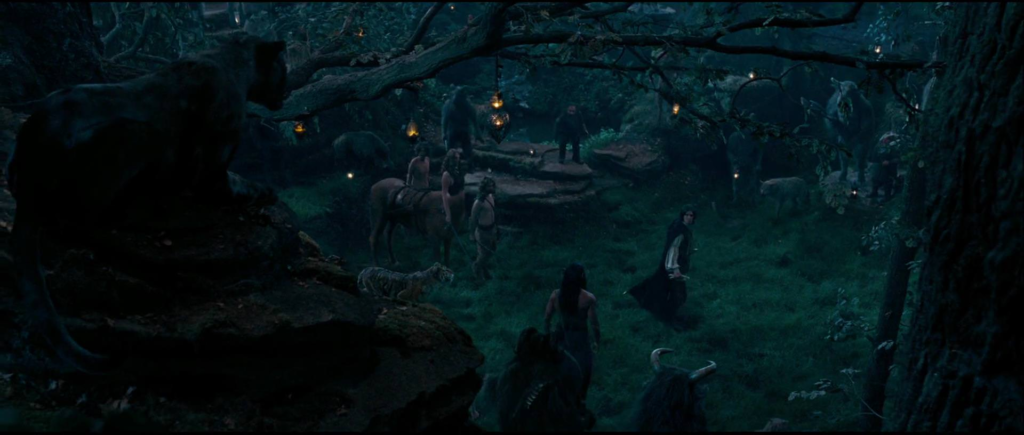
As he speaks that last line, Nikabrik moves toward Caspian menacingly, but Reepicheep gets between them and draws his sword. “Ha!” he says. “That is rich coming from you, dwarf! Or have you forgotten that it was your people who fought alongside the White Witch?” When I first saw the movie, I hated that line because it struck me as way too petty for Reepicheep. But multiple viewings have led me to believe that the movie actually intended him to be making a good point. I just wish they could have had him say it in a tone that sounded less like he wanted to pick a fight and without that little “ha” at the beginning. Anyway, the way Nikabrik casually swats aside Reepicheep’s little blade is funny.
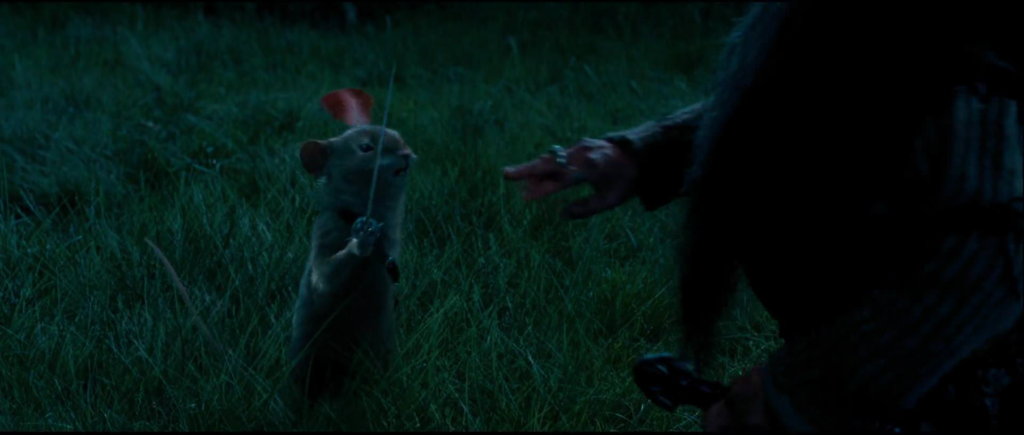
He says he’d gladly fight alongside the White Witch again if it would rid Narnia of “barbarians” like Caspian. “Then it is lucky that is not in your power to bring her back,” says Trufflehunter in the voice of a parent ending an argument between their children. “Or are you suggesting that we ask this boy to go against Aslan now?” This possibility draws a negative reaction from the gathered Narnians. “Some of you may have forgotten,” continues Trufflehunter, “but we badgers remember well Narnia was never right except when a Son of Adam was king.” Nikabrik scoffs at this. “He’s a Telmarine,” he says, “Why would we want him as our king?” Caspian assures him that he’ll make it worth their while. “Beyond these woods, I am a prince,” he says. “The Telmarine throne is rightfully mine. Help me claim it and I can bring peace between us.” Glenstorm speaks up. “It is true. The time is ripe. I watch the skies for it is mine to watch as it is yours to remember, Badger. Tarva, the Lord of Victory, and Alambil, the Lady of Peace, have come together in the high heavens and now here a Son of Adam has come forth to offer us back our freedom.” I doubt many viewers unfamiliar with the book will connect those lines with the planets we saw in the movie’s opening seconds but maybe some do. After all, they had to have been wondering why that seemingly random image was the first thing we saw. And in any case, Cornell S. John does a great job of giving the lines a mystical import.
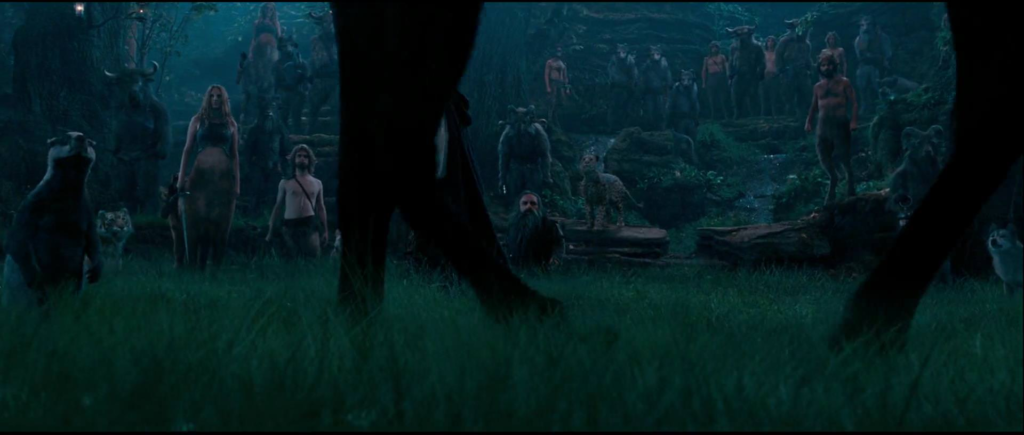
“Is this possible?” pipes up Pattertwig, a talking squirrel (voiced by soundtrack composer Harry Gregson-Williams.) “Do you really think there could be peace? Do you? I mean-I mean really?” Pattertwig is a minor character in both the book and the movie, but Gregson-Williams’s (intentionally) jittery vocal performance is endearing enough, especially considering he’s not a professional actor, that I kind of wish he could be in it more.
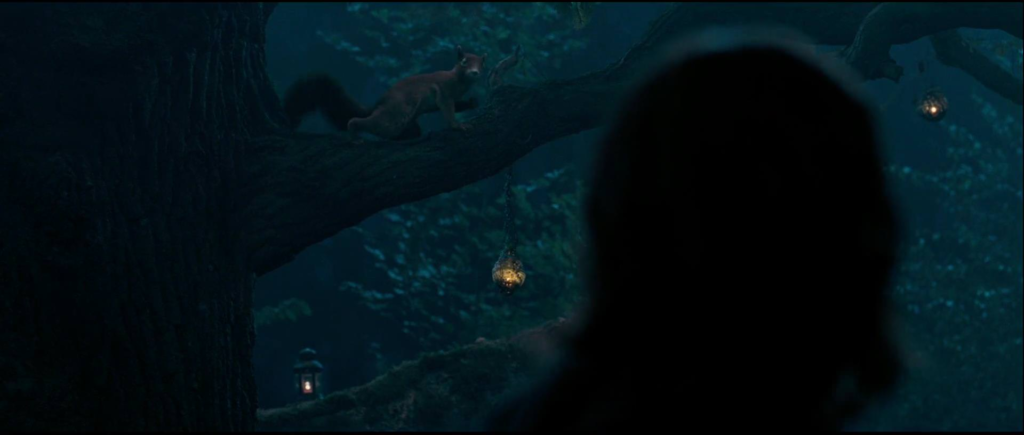
“Two days ago,” says Caspian, “I didn’t believe in the existence of talking animals or dwarfs or centaurs. Yet here you are in strength and numbers that we Telmarines could never have imagined. Whether this horn is magic or not, it brought us together and together we have a chance to take back what is ours.” Glenstorm draws his sword in salute. “If you will lead us,” he says, “then my sons and I offer you our swords.” Not only Glenstorm’s family but practically all the other Narnians follow suit with their weapons. “And we offer you our lives unreservedly,” says Reepicheep.
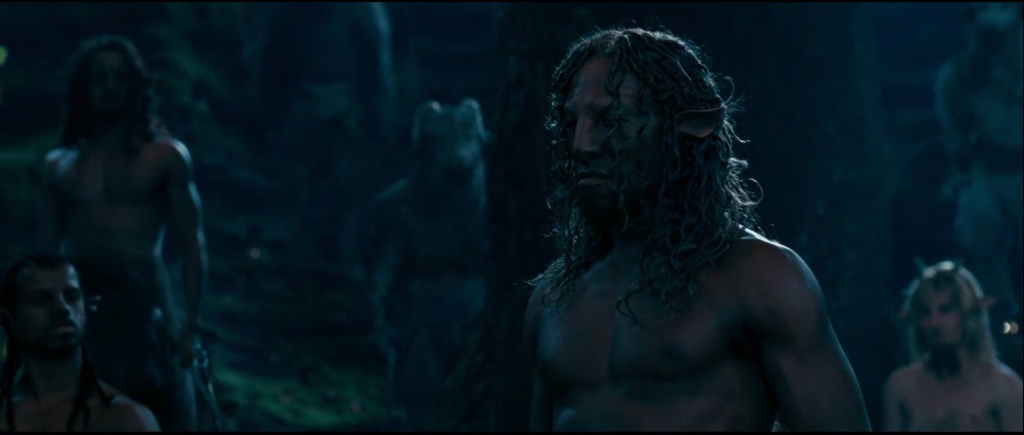
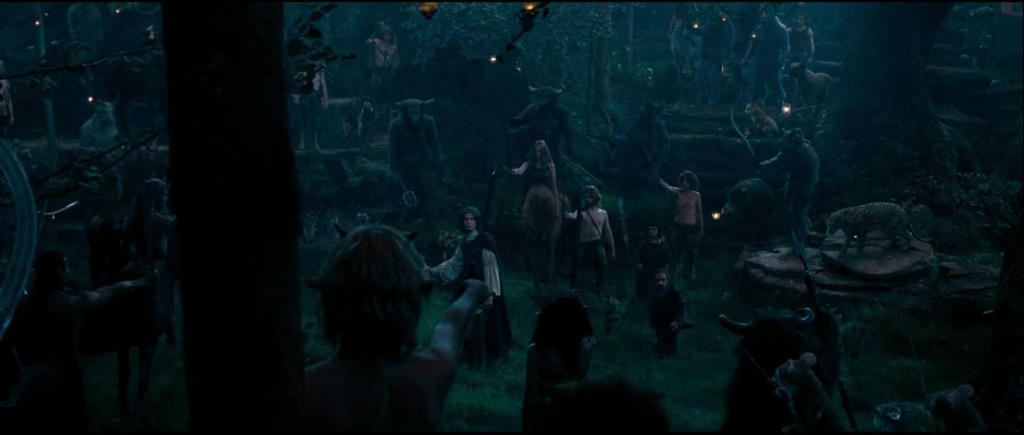
Now this scene has a lot to commend about it. Much of the dialogue takes inspiration from the book, even if it doesn’t always follow the exact wording. But it also really exemplifies what I consider one of this adaptation’s biggest faults, one that arguably weakens the movie as a story in its own right too. In the book, Caspian has grown up longing for the stories about Old Narnia to be true. At one point in his childhood, “he dreamed of Dwarfs and Dryads every night and tried very hard to make the dogs and cats in the castle talk to him. But the dogs only wagged their tails and the cats only purred.” His only interest in becoming king seems to be that it might give him the power the bring Old Narnia back to life. There’s no question in the book of whether he’ll go back to the castle to accuse Miraz of attempted murder or stay with Trufflehunter and company. “I’ve been looking for people like you all my life,” he tells them. You really get the impression from the book that Caspian was born in the wrong world and that by becoming the leader of Narnians he’s finding his true destiny. This is a big part of the story’s poetic appeal. In the movie however, while Caspian briefly seems intrigued to hear that minotaurs and centaurs aren’t extinct and, credit where credit is due, even more intrigued by the possibility of Aslan being out there, he mostly seems like he’s helping the Narnians so that they’ll help put him on the throne. It’s only thanks to moments like him going back to save Trufflehunter and Ben Barnes’s likeable performance that he doesn’t come across as completely mercenary. The line “whether this horn is magic or not, it brought us together” is especially problematic. It makes this version of Caspian less like the literary one who had a deep faith in Aslan than like Nikabrik who just wants to use others belief in Aslan if it furthers his own ends. While the screenwriters clearly want to tell a story proclaiming the importance of faith, I feel that they tipped their hand with that line, making me think they don’t have much, err, faith in faith. Also, keep in mind, Caspian was always a bit of a bland lead in the book.[14]The book that bears his name anyway. He’s arguably a bit more charismatic in The Voyage of the Dawn Treader and even in The Silver Chair in which he plays a minor but integral role. By taking away his dissatisfaction with the world into which he was born and his longing for something else, this Prince Caspian just made him that much blander! That is the main reason that while I can concede that the movie’s story improves on the book in several ways, I’m never going to agree that it’s an improvement on the whole.
It’s worth noting that the book also didn’t have a big scene where Caspian convinced all the Narnians to accept him as their king. Some of the dwarfs were described as being understandably suspicious at first but they were also described as quickly convinced. I understand why the movie felt like this was past the point of believability. It might be plausible enough that beasts like Trufflehunter would accept Caspian on the grounds that “Narnia was never right except when a son of Adam was King”[15]Some may find that rule itself to be ridiculously convenient but if you ask me, it corresponds enough to reality in our world to emotionally resonate. Of course, I know there are philosophers who … Continue reading but it’s a bit much to buy that the skeptical Trumpkin becomes as loyal and obedient to Caspian and the Pevensies as swiftly as he does. Even granting that this was a real storytelling problem in the source material though, this scene in the adaptation is very much a band-aid solution, one that arguably draws attention to the problem. All it took was that speech to get everyone on his side? Is that really better than them all agreeing right away?
“Miraz’s army will not be far behind us, Sire,” says Trufflehunter. “If we are to be ready for them,” says Caspian, “we’ll need to hurry to find soldiers and weapons. I’m sure they will be here soon.”
Next Week: Lucy Gets Another Glimpse of Aslan
References
| ↑1 | As I wrote in my last post, in the book, it was also his nurse. |
|---|---|
| ↑2 | I was going to argue that it doesn’t make sense for Caspian to run here since he was heading back to the Telmarines anyway and, at this point, Miraz is pretending that the Narnians were the ones after his nephew. But, on reflection, while Miraz may have “officially” sent these soldiers to rescue Caspian, he probably ordered some of them privately to kill him, so he could blame it on the Narnians. |
| ↑3 | We don’t see any feet being cut off, of course. In fact, if you pause the movie, you can see them intact as some Telmarine fall on their backs. But that seems to be the implication. This scene takes inspiration from a battle scene in the book, but it made more sense there. |
| ↑4 | Albeit not so much in Prince Caspian as in the next story, The Voyage of the Dawn Treader. |
| ↑5 | Honestly, even granting that the cinematic Reepicheep is more sarcastic than his literary counterpart, the role still doesn’t play that much to Izzard’s strengths as a performer anyway. |
| ↑6 | The only one funnier is Eustace Scrubb in the next movie and he’s more of a protagonist than a supporting character. Actually, Reepicheep himself becomes something of a protagonist in that story. |
| ↑7 | C. S. Lewis almost certainly didn’t intend the centaurs to be dark skinned but, while 2008 was a politically contentious year for my country (America), people were less sensitive about color blind casting specifically, so it went largely without comment. |
| ↑8 | “Little from you is really a bit too much!” Edmund says in the book. I’m surprised that line wasn’t in the movie. |
| ↑9 | I actually imagine the exchange about maps and brains in the book as being snippier than it is in the film. |
| ↑10 | Though maybe I’m not giving Star Wars or The Adventures of Robin Hood enough credit. |
| ↑11 | To be fair to the movie, Caspian hasn’t yet reached the location he’s at when the Pevensies and Trumpkin are searching for him in the book. |
| ↑12 | If the line wasn’t in the screenplay originally, I have to credit the people who wrote the marketing tie-in books with being better at exposition than the screenwriters! |
| ↑13 | Aren’t the minotaurs supposed to be bad guys? We’ll get to that later. |
| ↑14 | The book that bears his name anyway. He’s arguably a bit more charismatic in The Voyage of the Dawn Treader and even in The Silver Chair in which he plays a minor but integral role. |
| ↑15 | Some may find that rule itself to be ridiculously convenient but if you ask me, it corresponds enough to reality in our world to emotionally resonate. Of course, I know there are philosophers who believe that man is just another animal and so would beg to differ. |
